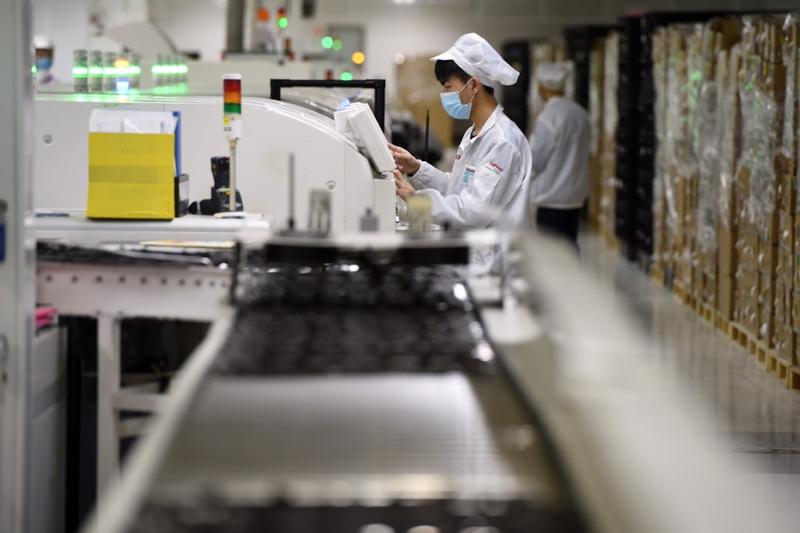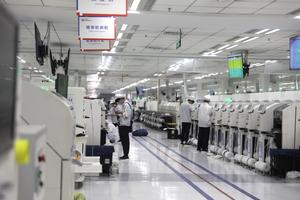 In this undated file photo, employees perform tests at an LCFC (Hefei) Electronics Technology Co Ltd unit in Hefei, Anhui province. The factory serves as Lenovo's largest PC manufacturing base in China. (PHOTO / XINHUA)
In this undated file photo, employees perform tests at an LCFC (Hefei) Electronics Technology Co Ltd unit in Hefei, Anhui province. The factory serves as Lenovo's largest PC manufacturing base in China. (PHOTO / XINHUA)
As the world's largest personal computer maker, Lenovo Group Ltd is working hard to cut its carbon footprint and leverage its edge in digital technologies to promote green manufacturing.
Green manufacturing, also known as environmentally conscious manufacturing, deals with green principles that are concerned with developing methods for manufacturing products from conceptual design to final delivery to consumers, and ultimately to end-of-use green disposal, in order to satisfy environmental standards and requirements.
Yang Yuanqing, chairman and CEO of Lenovo, said: "As a leader of a business employing 63,000 people and serving customers in 180 markets around the world, I am acutely aware and focused on the wider role Lenovo plays in the world today. We have a responsibility to all our stakeholders to make progress on our climate change commitments."
During the fiscal year 2019-2020, Lenovo achieved a 92 percent reduction in its scope 1 and scope 2 greenhouse gas emissions relative to the fiscal year 2009-2010, thus meeting its 2020 targets. Scope 1 and scope 2 greenhouse gas emissions are those from Lenovo's internal operations and the direct emissions from its facilities, as well as its energy suppliers and their operational emissions which are attributable to Lenovo's activities.
The company also expanded its commitment to sustainable operations with on-site renewable energy installations like the 3.9-megawatt solar panel array recently installed at its North American facilities in North Carolina, the United States.
The results came after Lenovo's long-term commitment to pioneer and experiment with the latest green manufacturing methodologies. In 2019, the company participated in the eco-design pilot project of the Ministry of Industry and Information Technology, the top industry regulator in China.
As a leader of a business employing 63,000 people and serving customers in 180 markets around the world, I am acutely aware and focused on the wider role Lenovo plays in the world today. We have a responsibility to all our stakeholders to make progress on our climate change commitments.
Yang Yuanqing, chairman and CEO of Lenovo
After three years of exploration and practice, Lenovo's team successfully demonstrated a green product development concept guided by life cycle assessment principles for microcomputer products, which included design, manufacturing and recycling.
ALSO READ: Lenovo, Baidu among heavyweights expanding presence in Southwest China
In August 2019, the ministry awarded Lenovo's manufacturing sites in Chengdu, Sichuan province and Hefei, Anhui province with the "National Green Factory" award for successfully applying a green supply chain system. The award is based on the successful application of five criteria: green production, supplier management, green logistics, green recycling and green information disclosure. Moreover, a total of 75 models of its desktop and notebook products were recognized with "Green Design Product "awards.
On the basis of these positive results, Lenovo said it has continued to invest in green manufacturing through energy-saving and environmentally friendly products, explore innovative technology and solutions including recycling electronic waste and reduce emissions through innovations that produce lighter product packaging.
In November 2019, Lenovo announced a strategic partnership with Schneider Electric to develop smart green manufacturing solutions for the Chinese manufacturing sector.
Leveraging the strengths of both companies, the strategic partnerships create powerful synergies by combining Lenovo's industrial internet of things solution with Schneider Electric's smart green manufacturing solution based on EcoStruxure. The combination builds a blueprint that can be provided as a smart manufacturing solution to hybrid manufacturing operations, regardless of the vertical industry they operate in.
In particular, the focus includes artificial intelligence algorithms and big data as it relates to all aspects of efficiency management, predictive maintenance, production quality and other industrial applications.
 In this undated file photo, employees perform tests at an LCFC (Hefei) Electronics Technology Co Ltd unit in Hefei, Anhui province. The factory serves as Lenovo's largest PC manufacturing base in China. (PHOTO / XINHUA)
In this undated file photo, employees perform tests at an LCFC (Hefei) Electronics Technology Co Ltd unit in Hefei, Anhui province. The factory serves as Lenovo's largest PC manufacturing base in China. (PHOTO / XINHUA)
Schneider Electric Chairman and CEO Jean-Pascal Tricoire, said: "Making the next shift toward green smart manufacturing is critical to nurture a more efficient, low-carbon and sustainable future. Partnering with Lenovo is a great opportunity to further unleash the power of digital innovation in the physical world of manufacturing. A scaleup of IoT and smart solutions is key for greater efficiency and a more sustainable planet."
When it comes to the green management of its supply chains, Lenovo has been working to practice accurate reporting and reduction of greenhouse gas emissions, water usage and waste generation. The company asks suppliers every year to formally report their environmental impact data via platforms such as the CDP or Carbon Disclosure Project reporting platform.
CDP is an international, not-for-profit organization providing the system for companies and cities to measure, disclose, manage and share vital environmental information.
Sabrina Zhang, country director for China at CDP, said: "Lenovo, as an internationally leading company, embraces traditional Chinese business wisdom and contemporary universal business ethics and fully understands that transparency can create value and wisdom through good data."
Lenovo received the top score from CDP from the supplier leadership engagement board. The CDP recognizes that an organization's average upstream emissions are around 5.5 times greater than its direct operations. The top score demonstrates Lenovo's effectiveness in engaging its suppliers on climate change, CDP said.
Despite the achievements, challenges still exist. Lenovo said the greatest challenge in reducing absolute supplier emissions and environmental impact is not individual supplier performance, but growth in business and procurement spending, which has increased 200 percent since 2010, while emissions have grown approximately 100 percent.
To solve these problems, Lenovo said it will continue adopting a string of sophisticated solutions including investment into research and development of new technologies as well as solar renewable energy installations.
John Cerretani, vice-president, and chief corporate responsibility officer at Lenovo, said: "The company is committed to operate as a sustainable business with policies and procedures that benefit our environment and establish a culture of integrity. We plan for long-term success by integrating the 10 principles of the United Nations Global Compact into strategies and operations."
READ MORE: Lenovo working with CICC on US$1.5b Shanghai listing
The UN Global Compact is a strategic initiative for companies that undertake to align their business activities and strategies with 10 universally recognized principles in the areas of human rights, labor standards, environmental protection and the fight against corruption.


